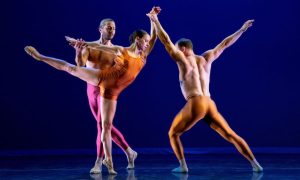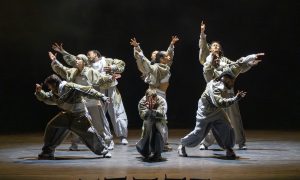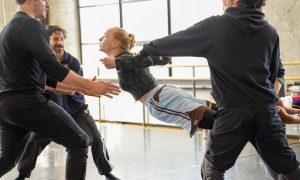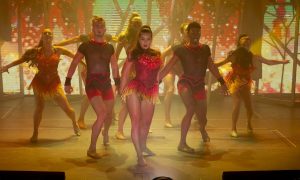Working as a professional dancer is a challenging path, and not everyone is cut out for it. Whether you are forced to stop dancing due to injury or you simply feel drawn to another kind of lifestyle, figuring out what to do instead can be difficult. However, dancers are resourceful, disciplined, creative, and intelligent people that have a multitude of skills that can be utilized in many different professions. Luckily, professional dancers only make up a small part of the workforce that supports the entire field of dance, so there are many opportunities available that will still allow you to support your passion for dance. Here are just a few!
1. Choreographer/Director
This is often a logical progression for people who decide to step off the stage. Whether it’s running your own dance company or choreographing for Broadway, you can take your dance knowledge and embark on a creative career of your own. It’s a difficult path with many of the same pitfalls as a performance career, but many people find they are more suited to creating dances than performing them.
2. Lighting Designer/Set Designer
Be the person who makes all the magic happen on stage! If you love the theater and have both an artistic eye and a technology bent, becoming a lighting designer could be the path for you. Similar to lighting design, creating sets can give artistic, creative souls a rewarding career path in the theater without actually being on stage. If you’re good with your hands and like to paint, you might consider pursuing how to put those skills to use by becoming a set designer.
3. Stage Management/Production Crew
A good stage manager is crucial to the arc of a show, from rehearsals to closing night. If you have good attention to detail, enjoy overseeing people, and are good at problem solving in a crisis, you might be the type of person the dance world needs to run their shows! If you enjoy working on a team and like the technological aspects of putting together a show, being on a production crew can give you an inside look at what really happens backstage.
4. Company Managing/Administration
Have you ever wondered how dance companies book their gigs? Are you curious about the financial aspects of running a dance company? Do you like travelling and working with lots of people? Company managers do all of these things. From seeking out venues to organizing international tours, company managers are at the heart of it all. They make many of the important decisions that help keep dance companies working and performing. Depending on the size of the dance company, there might be a multitude of different administrative positions available as well, from general office management, to marketing, to fundraising, dance companies require a diverse team of people to run smoothly.
5. General Arts Administration
In addition to dance companies, there are many different types of institutions that support the arts where administrative-minded folks might be able to pursue careers. Some examples include theaters, foundations, museums, community centers, and more. From accounting to development, from programming to facilities management, you can carve out a place for yourself among the people who make it possible for dancers to rehearse, create, and eventually perform on stage.
 6. Dance Writer
6. Dance Writer
As evidenced by this article, you can turn both your passion for dance and writing into a career! From advice articles to performance reviews, you can be an integral part of the dance community by using language to support the field of dance.
7. Physical Therapist
This one takes some extra schooling, but physical therapists are crucial to the field of dance. If you love learning about the body, enjoy science, and like to help people, setting off on this path can lead you to a rewarding career. Your understanding of what dancers need and go through on a regular basis with their bodies will help make you a compassionate physical therapist who can guide dancers through a healing process.
8. Yoga/Pilates/Somatic Teacher
Many dancers choose the path of teaching in a related-field, such as yoga, pilates, or even Feldenkrais or Gyrotonic methods. These movement practices are both good alternatives and complements to dance training, so you might feel naturally drawn to these fields.
9. Massage Therapist
Do you like working with people and a healing, relaxing atmosphere? With some training you might be able to help people to relax and restore their bodies.
10. Graphic Designer
From website design to posters for subway platforms, dancers need excellent visuals to promote their work. If you enjoy working on computers and experimenting with visual art, you can support dance by creating the images that draw people into the theater!
11. Athletic Coach/Personal Trainer
Have you always loved the fitness aspect of dancing? Maybe you even played sports as a kid before running off to ballet class? With some extra training you can turn your passion for fitness into a career as a coach, either for private clients or maybe even for sports teams if you have the experience.
12. Costume Designer
If you love to sew, designing costumes can be an excellent way to stay connected to the world of dance and performance. In collaboration with directors/choreographers and often lighting/set designers, you can be an integral part of an entire production’s visual design.
13. Photographer/Videographer
Dancers are in constant need of photos for marketing materials, as well as for personal headshots and for websites, so there is definite market for those who are skilled with a camera. Additionally, choreographers need video record of their work for both archival and promotional purposes.
14. Group Fitness Instructor
Fitness classes are on rise for fun ways to exercise, and dancers have so much knowledge about the body to share in this format! Currently trending are “barre” classes that use techniques from ballet to give students a full body workout. Are you energetic and like to motivate people? Check out if becoming a Zumba teacher is right for you. If you like teaching, you can turn your passion for movement into a teaching career.
15. Public School Teacher
If you enjoy working with children, many college dance programs offer a K-12 certification that will allow you to teach dance in public schools, as well as other subjects. This can be a rewarding way to use the creativity of dance in an educational format.
By Katherine Moore of Dance Informa.















